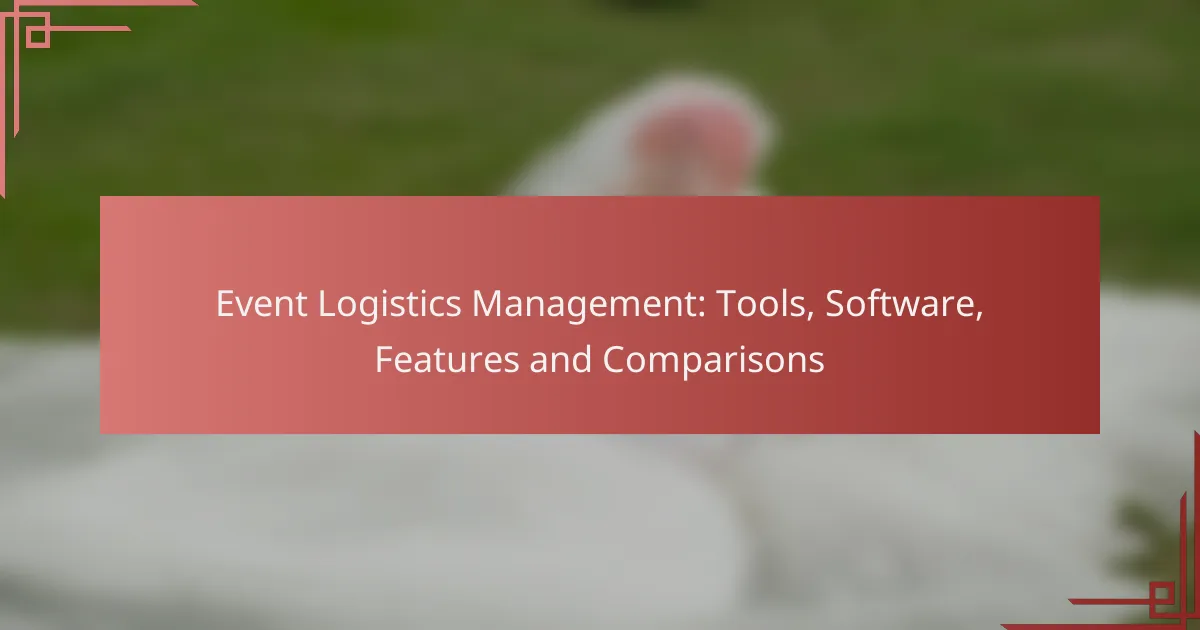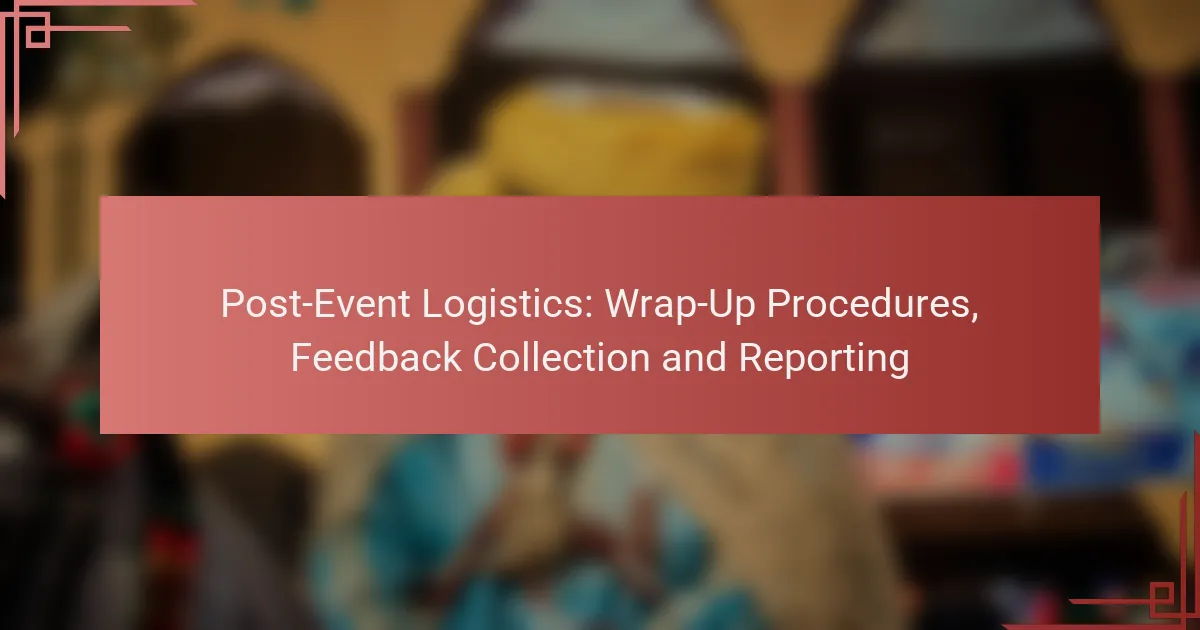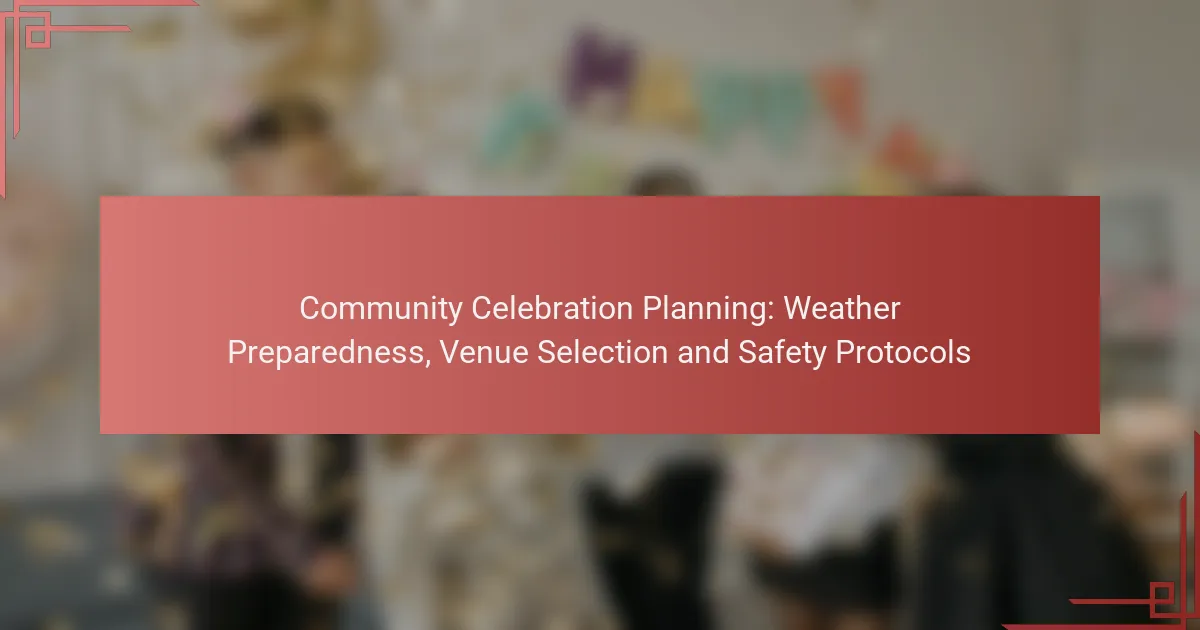Effective event logistics management is crucial for the seamless planning and execution of events, leveraging specialized tools and software to enhance efficiency. By evaluating various platforms, event organizers can find solutions that address their specific needs, from registration to post-event analysis, while incorporating essential features like real-time tracking and budget management.
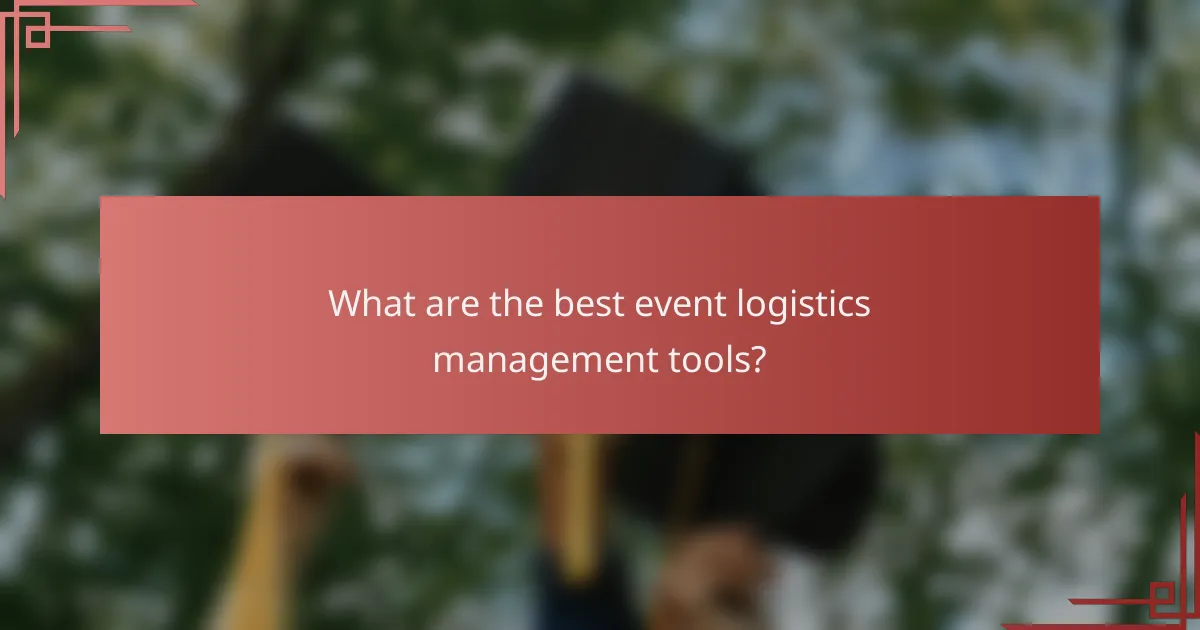
What are the best event logistics management tools?
The best event logistics management tools streamline planning, coordination, and execution of events, ensuring efficiency and effectiveness. Key options include platforms that cater to various aspects of event management, from registration to post-event analysis.
Eventbrite
Eventbrite is a popular platform for event registration and ticketing, making it ideal for organizers looking to manage attendees easily. It offers customizable event pages, ticketing options, and promotional tools to boost visibility.
Consider using Eventbrite if your event is focused on ticket sales and you need a user-friendly interface. Its integration with social media can help increase attendance, but be aware of service fees that can affect your budget.
Cvent
Cvent is a comprehensive event management software that covers everything from venue selection to attendee engagement. It is particularly suited for large-scale events and corporate gatherings, providing tools for budgeting, registration, and reporting.
When using Cvent, take advantage of its robust analytics features to measure event success. However, its complexity may require a learning curve, so ensure your team is prepared for the initial setup and training.
Asana
Asana is a project management tool that can be adapted for event logistics by organizing tasks, timelines, and team collaboration. It allows teams to track progress and assign responsibilities, making it easier to manage multiple aspects of an event.
Utilize Asana to create checklists and timelines for your event planning. While it excels in task management, it may lack specialized features like ticketing or attendee tracking, so consider pairing it with other tools for a complete solution.
Whova
Whova is designed specifically for event management, offering features like attendee networking, agenda management, and feedback collection. It enhances participant engagement through its mobile app, allowing attendees to connect and interact during the event.
Choose Whova if you want to foster networking among attendees. Its user-friendly interface is a plus, but ensure you have a clear plan for utilizing its features to maximize attendee interaction and satisfaction.
Monday.com
Monday.com is a versatile work operating system that can be customized for event logistics management. It allows teams to visualize workflows, track deadlines, and manage resources effectively, making it suitable for various event types.
Leverage Monday.com to create a visual overview of your event planning process. While it offers flexibility, be cautious about overcomplicating your setup with too many features, which can lead to confusion among team members.
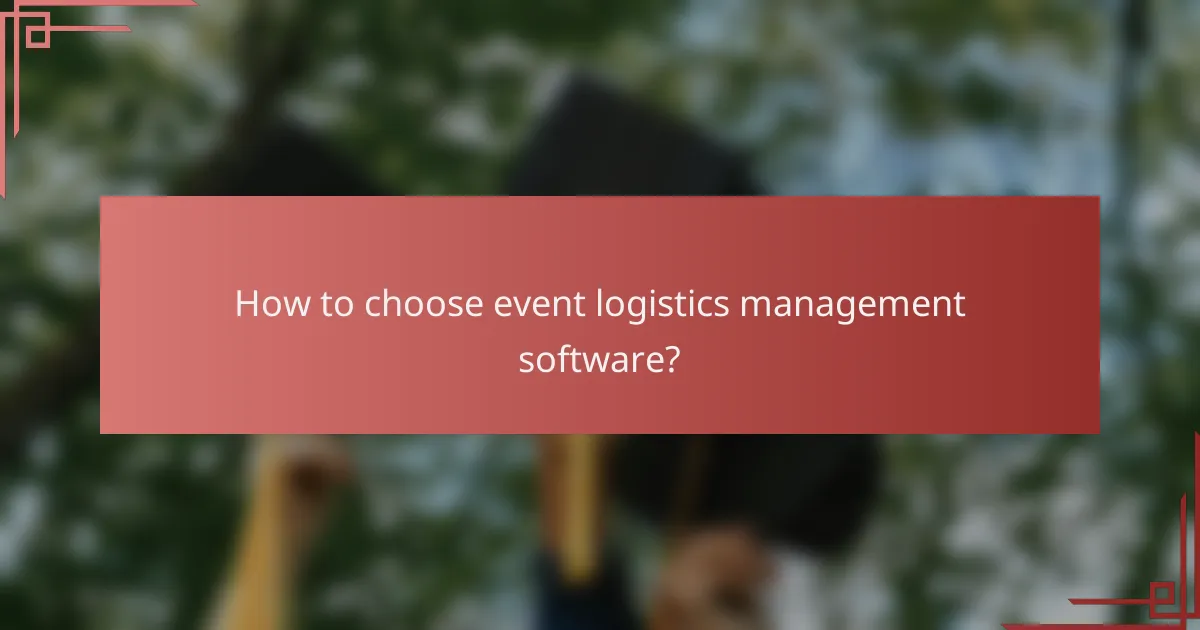
How to choose event logistics management software?
Choosing event logistics management software involves assessing your specific needs, the software’s features, and its usability. Focus on how well the software can streamline your event processes, integrate with existing tools, and fit within your budget.
Assess user interface
The user interface (UI) of event logistics management software is crucial for ease of use. A clean, intuitive design can significantly reduce the learning curve for your team, allowing for quicker adoption and efficiency. Look for software that offers customizable dashboards and clear navigation.
Consider testing the UI through demos or free trials to gauge how well it aligns with your team’s workflow. A well-designed UI should facilitate quick access to key features, minimizing the time spent on training and maximizing productivity during events.
Evaluate integration capabilities
Integration capabilities are essential for ensuring that your event logistics management software works seamlessly with other tools you use, such as CRM systems, email marketing platforms, and payment processors. Look for software that supports popular integrations to avoid data silos and enhance overall efficiency.
Check if the software offers APIs or pre-built connectors to facilitate these integrations. A robust integration framework can save time and reduce errors by automating data transfer between systems, which is particularly important for managing guest lists and tracking registrations.
Consider pricing models
When evaluating event logistics management software, consider the different pricing models available. Some software may charge a flat fee, while others operate on a subscription basis or charge per event. Understanding these models can help you choose a solution that fits your budget and expected usage.
Compare the total cost of ownership, including any additional fees for features, support, or integrations. It’s wise to assess whether the pricing aligns with the value provided, ensuring that you are investing in a solution that meets your event management needs without overspending.
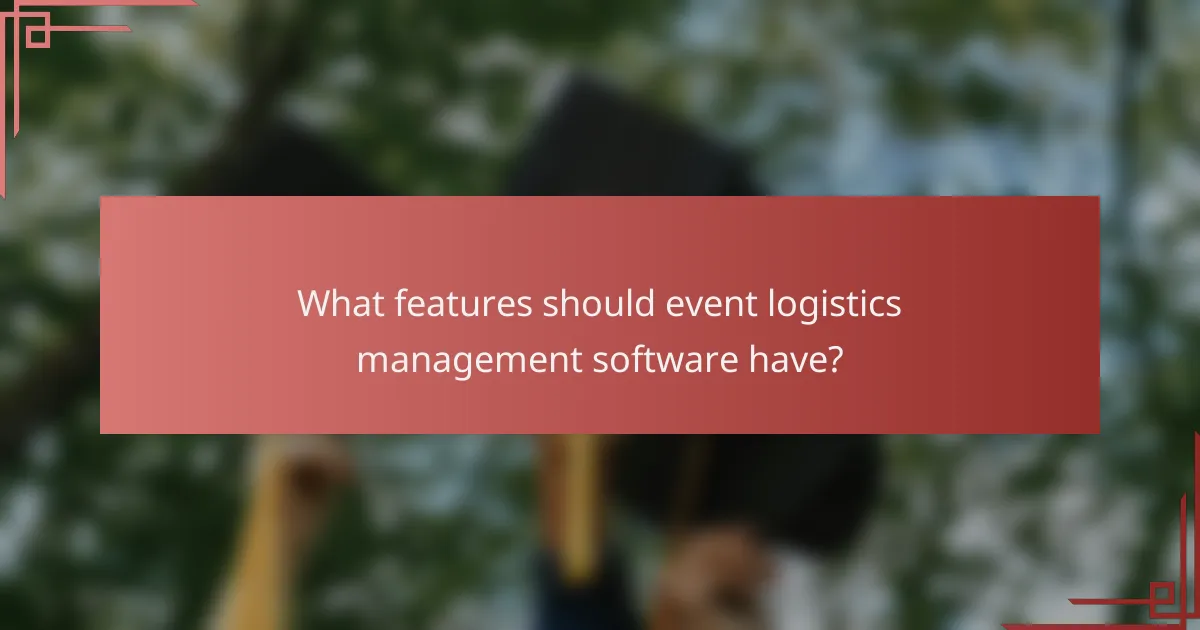
What features should event logistics management software have?
Event logistics management software should include essential features that streamline planning, execution, and analysis of events. Key functionalities like real-time tracking, budget management, attendee management, and reporting capabilities are crucial for ensuring successful event logistics.
Real-time tracking
Real-time tracking allows event planners to monitor the status of various logistics components, such as equipment, supplies, and transportation. This feature helps ensure that everything is on schedule and can quickly identify any delays or issues that arise during the event.
Consider using GPS-enabled tools that provide live updates on the location of shipments or resources. This transparency not only improves coordination but also enhances communication among team members and stakeholders.
Budget management
Effective budget management tools help event organizers track expenses, manage vendor payments, and forecast costs accurately. These features enable planners to stay within budget and make informed financial decisions throughout the event lifecycle.
Look for software that offers budget templates and real-time expense tracking. This can help prevent overspending and allow for adjustments based on actual costs versus projected budgets. Regularly reviewing budget reports can also highlight areas for potential savings.
Attendee management
Attendee management features facilitate registration, ticketing, and communication with participants. This functionality is vital for ensuring a smooth experience for attendees from the moment they register until the event concludes.
Choose software that allows for easy online registration and provides options for personalized communication, such as email reminders and updates. Additionally, tracking attendee preferences and feedback can help improve future events.
Reporting and analytics
Reporting and analytics tools provide insights into event performance, helping organizers evaluate success and identify areas for improvement. These features can analyze attendee engagement, budget adherence, and logistical efficiency.
Utilize software that generates customizable reports to assess key metrics, such as attendance rates and satisfaction scores. This data is invaluable for making data-driven decisions for future events and demonstrating ROI to stakeholders.

How does Cvent compare to Eventbrite?
Cvent and Eventbrite serve different market segments, with Cvent focusing on large-scale events and Eventbrite catering to smaller gatherings. While both platforms offer essential event management features, their pricing structures and functionalities vary significantly based on the size and complexity of the event.
Cvent for large events
Cvent is designed for managing large events such as conferences, trade shows, and corporate meetings. It provides comprehensive tools for registration, venue selection, and attendee engagement, making it suitable for complex event logistics.
Key features include customizable registration forms, advanced reporting, and integration with other enterprise software. Organizations often appreciate Cvent’s ability to handle multiple sessions and large attendee lists efficiently.
Eventbrite for small events
Eventbrite is ideal for smaller events like workshops, social gatherings, and local meetups. Its user-friendly interface allows event organizers to set up events quickly and manage ticket sales with ease.
Eventbrite offers essential features such as ticketing options, promotional tools, and basic analytics. This platform is often favored by individuals and small businesses due to its straightforward pricing and accessibility.
Pricing differences
Cvent typically operates on a subscription model, which can range from hundreds to thousands of dollars annually, depending on the features and scale of the events. This pricing structure is more suitable for organizations that host multiple large events throughout the year.
In contrast, Eventbrite charges a fee per ticket sold, which can be a percentage of the ticket price or a flat fee. This makes it more cost-effective for smaller events, where upfront costs are a concern. Organizers should evaluate their event size and budget to choose the most appropriate platform.
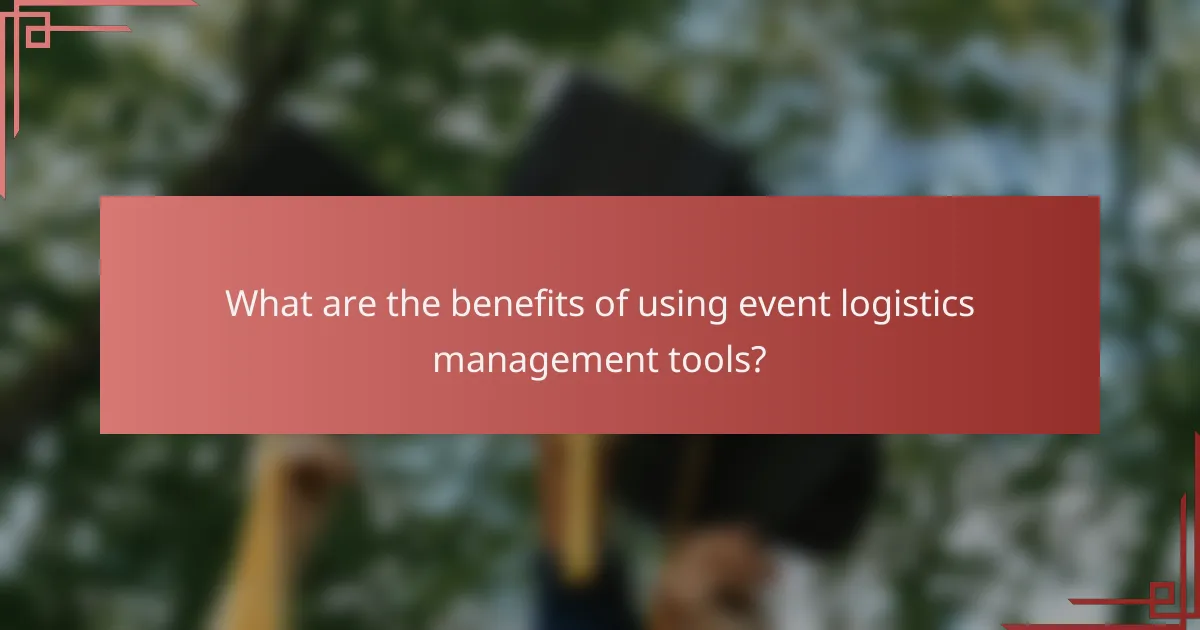
What are the benefits of using event logistics management tools?
Event logistics management tools streamline the planning and execution of events, enhancing overall organization and coordination. They help manage resources, track progress, and ensure timely delivery of services, ultimately leading to a more successful event experience.
Improved efficiency
Using event logistics management tools significantly boosts efficiency by automating repetitive tasks and optimizing resource allocation. This allows event planners to focus on strategic aspects rather than getting bogged down in administrative details.
For example, tools can automate scheduling, inventory management, and communication with vendors, reducing the time spent on these tasks by up to 50%. By centralizing information, teams can quickly access necessary data, minimizing delays and miscommunication.
To maximize efficiency, choose tools that integrate with existing systems and provide real-time updates. Avoid platforms that require extensive training, as this can lead to wasted time and resources. Regularly review processes to identify areas where automation can further enhance productivity.
